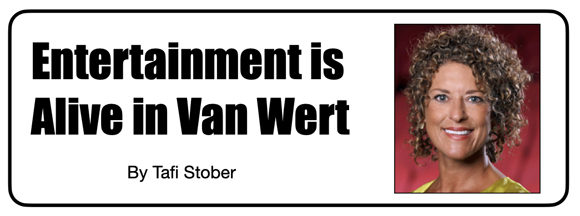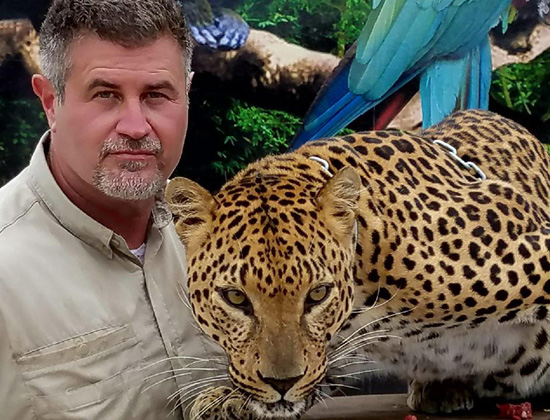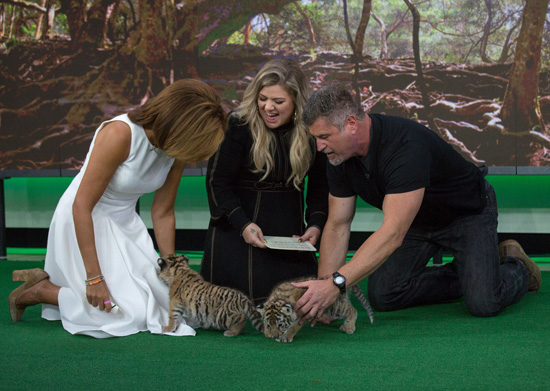
It’s about to get wild…
Families love to make memories at the Niswonger. We have discovered that weekend matinees are the sweet spot for bringing children of all ages to Van Wert for entertainment. Jeffery-Mohr Family Dentistry believes that Edu/Tainment shows are life enriching for attendees of all ages. They have partnered with Van Wert Live yet again to bring The Wild World of Animals Show to the Niswonger at 3 p.m. Sunday, April 30. The Wild World of Animals Show was voted one of the top five Edu/tainment shows in the world in 2007 by the International Association of Amusement Parks and Attractions. They have performed in 36 different states and are continuing to grow a strong audience with a stage performance that is a replica of the beloved Jack Hanna Wildlife Show.
The Wild World Of Animals staff has 30 years of experience working with and caring for wild animals. They are located in the heart of Southwestern Pennsylvania and specialize in educational and entertaining wildlife shows. The company of caregivers nurtures over 200 animals including big cats, wolves, other large carnivores, primates, birds of prey, parrots, venomous and non-venomous snakes, crocodilians, and other various reptiles, small mammals, and amphibians. They travel the entire country with their animal family sharing awareness of the unique nature of our animal friends.
The Wild World Of Animals Trainer, Grant Kemmerer, has been working with, training, and caring for wildlife for over 30 years. Since childhood, he was fascinated with animals of every kind. After graduating from Florida International University, he started working professionally with animals in Miami, FL. He holds many state permits as well as federal permits from US Fish and Wildlife, US Department of the Interior and the US Department of Agriculture. Trainer Kemmerer has been a guest animal expert on nationally televised shows such as Anderson Cooper, CBS Early Show, Fox and Friends, Martha Stewart, and the Meredith Vieira Show.

The show entails about 13 different animals ranging from reptiles, birds, and mammals. The lineup is very diverse, mirroring one of the themes of the show: the importance of all animals. The show is fast-paced and has a great balance of fun and facts, which is sure to hold everyone’s attention.
Animal care and ethics are at the heart of The Wild World Of Animals culture. The following information was shared from Trainer Grant Kemmerer to give a greater understanding of the essential care provided to their animal friends.
Grant and his staff are often asked questions such as: “Where do the animals come from?”; “What do you do with them when they are no longer part of the show?”; “Is it cruel to keep them in captivity?” This section is designed to address issues like these in great detail.
Currently, they care for about 200 animals. The source of these animals can be roughly broken down into three categories.
1) Animals are given by people who purchase (legally) an animal in a pet store and no longer wish to care for it. These would be primarily reptiles or bird species that are common in that trade – species such as ball pythons, boa constrictors, spur thigh tortoises, alligators (legal in Pennsylvania), parrots, tarantulas, etc. People think that zoos will take these animals, but, as a rule, zoos will not take unwanted pets, feeling it gives the wrong message.
2) Injured or orphaned animals, which is roughly 80 percent of our North American wildlife arrives throu rehabilitators or rescues. These organizations are tasked with trying to return these animals to the wild, but due to various circumstances some of the animals are not able to be returned. Things such as an injury that is too debilitating (loss of eye, limb, wing, etc.,) the animal being orphaned too young and therefore being hand-raised from an early age, becoming too bonded/imprinted to people or when the animal does not learn the proper skills to survive in the wild. The determination of release ability is decided by a licensed veterinarian. States often give a time frame for placement, sometimes followed by euthanasia if no home is found.
3) Animals that are born at their facility or other licensed facilities. These animals come either through purchase (endangered species cannot be bought, sold, traded or bartered across state lines without additional permits), trade or donation. Animals seen in captivity in the United States are almost always born in the United States, most countries have bans on wildlife exports, and there are international treaties that govern animals being taken from the wild. Exceptions are made at times when zoos look to bring in very specific and small numbers of species to enhance the gene pool of a captive breeding population. Even then, it is a long and laborious process that is very complicated and heavily regulated.

There are numerous state and federal (in some cases municipal and county as well) agencies involved regarding the keeping of wild animals. The WWOA holds licenses from US Fish and Wildlife, US Department of the Interior, US Department of Agriculture, and the Pennsylvania Game Commission, as well as many other state fish and game departments since they have performed programs in 36 different states. Every aspect related to these animals, such as care, transportation, feeding, housing, veterinary care, acquisition, and disposition is controlled by one or more agencies.
There is a misconception sometimes with the public that you can go online and buy an exotic animal and have it delivered to your door. This is simply not true, even websites that show animals for sale are only doing business with legal buyers and sellers, i.e. people with proper licenses and/or permits. Many states, counties, and municipalities outright ban the private ownership of exotic animals. Many federal laws exist as well, so even if it were legal in one of the few states that allow private ownership of exotic animals; it would be trumped by the federal laws.
Van Wert Live is honored to work with Trainer Grant Kemmerer whose passion for animals and their care is at the heart of his purpose. We believe that the Niswonger stage is a window to the world and are thrilled to indulge the curiosity of animal enthusiasts of all ages with a show that is certain to educate and entertain. We welcome you to walk on the wild side with us!
POSTED: 04/05/23 at 3:33 am. FILED UNDER: Arts & Entertainment







